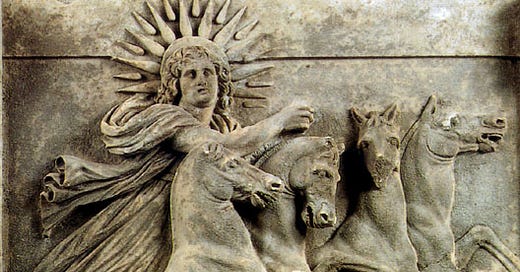My grandfather loved to read. It’s a good thing since he was in the textbook business. Knowing I had a problem reading, he would ask how I was making out with my books. I would lie and say I read three books while still working on the same one from the last time he asked. I would rather lie to my grandfather than disappoint him. Saying “I’m doing the best I can.” is never an answer that occurs naturally to a child.
The St. Ann Street Gang, the Campbells, O’Ferrals, and Swazee’s used to take an annual junket to Florida to watch spring training and play cards. My grandfather used to reserve one suitcase for his books and my grandmother’s shoes. We called my grandmother “Bubba,” which is funny because she was anything but a Bubba. When her doctor told her she had to start wearing tennis shoes, she bequeathed her three dozen stilettos and patent leather Mary Jane shoes to my sister. Bubba tried very hard to influence Martha’s sense of style. I don’t think it worked.
Grandaddy loved to read Lewis Grizzard. When a new book came out, he’d make me ride with him to the mall so he could pick up his order, and then, we’d drive down to the Walthall to get a haircut and introduce me to guys who were in the Mississippi Legislature in 1950, but haven’t done all that much since.
He liked Lewis Grizzard because, when Grizzard wrote, it was okay to be from the South again, and my grandfather missed hearing good things about his home.
In the 1930s and 40s, Mississippi tried to market itself as the “Hospitality State.” It worked for a while; couples from New York would take a train down to Mississippi to watch belle gowns float across the lawn in Natchez. Fay Wray was cast in a movie playing Leslie Nielson’s mother, set in Natchez, but shot in California. She said she wished they’d shot more on location because she thought Natchez was beautiful.
In 1955, photographs of Emmett Till showed up in Life Magazine, and people started saying, “That’s not very hospitable at all.” In 1964, two boys from up north and a local boy were found buried in an earthen dam in Neshoba County, and people started thinking we’d been lying about this hospitality thing.
When my Uncle Boyd was President of the US Chamber of Commerce, he traveled all over the country, and people fawned over his Southern charm and old-world manners. Things were different when it was my Father and Grandfather’s turn to visit the rest of the country. My grandfather was used to people thinking that anyone from Mississippi must be intellectually constipated, but now, they were starting to think we were brutish, vengeful, and evil. Nobody wants to be thought of as evil.
By 1970, between Ross Barnett, Alan C Thompson, and the Klu Klux Klan, Jackson, Mississippi, had a pretty terrible reputation, and businesses not from here were losing interest in doing business here.
Looking back on it now, the men who changed the trajectory of Jackson and Mississippi were in their early forties. That looks awfully young when you’re sixty. Being mostly financial types, they turned to the creative types to come up with a new way to describe our city, which had primarily been known for brutality to civil rights protestors.
“The Bold New City” said two things: only proud people can be bold, and despite our past, we’re still proud, but we’re new too. We’re new enough to let the past be but the past and forge a new vision for ourselves.
I never heard anyone say out loud, “Let’s tear down anything associated with the Civil Rights Movement and put something else there.” That’s what happened, though. The Freedom Rider’s bus station became the city planitarium. The Woolworths became a parking garage. When we had the money to fix the City Library, it was condemned due to asbestos infestation, and we bought the old Sears Building instead and locked the doors to the old library before selling it to the Mississippi Baptists. It still sits empty. I think Jackson would use it again, but we no longer have that kind of money.
It worked for a while. Jackson was called one of the fastest-growing cities in the South. We were, too. We became known for our cultural progressiveness with the art museum, the symphony, and the International Ballet Competition. For one brief, shining moment, Jackson actually became “The Bold New City.”
Helios drove the sun's chariot across the sky each night, bringing light to the world. One day, his son Phaethon asked for the privilege of piloting the burning chariot for just one day. Lacking his father’s strength, Phaethon loosed the horse’s reins and crashed the burning chariot into the sea. Sometimes, people ask why Jackson is no longer “The Bold New City,” and all I can say is that we didn’t have the strength of Helios and lost control of the horses.




